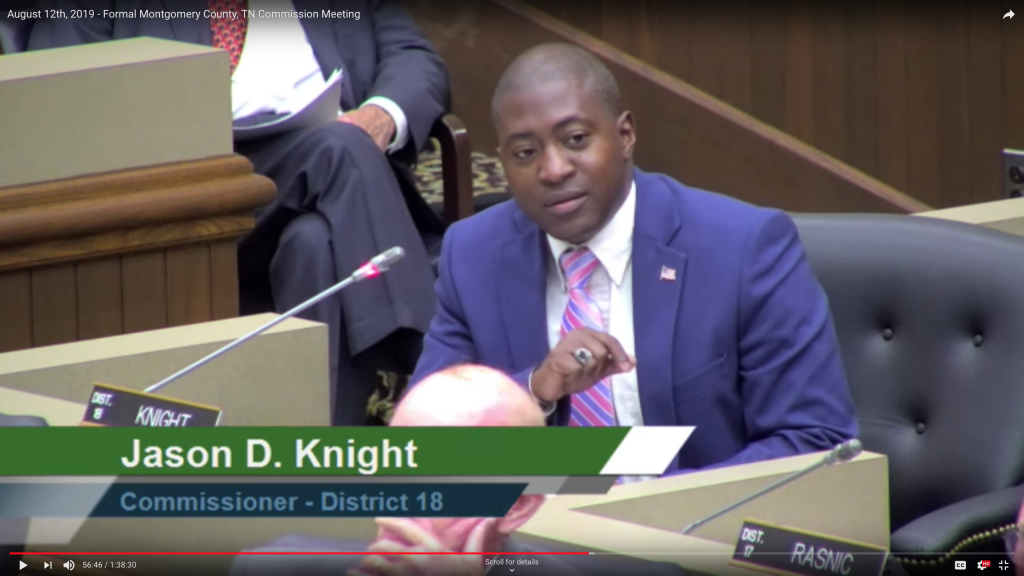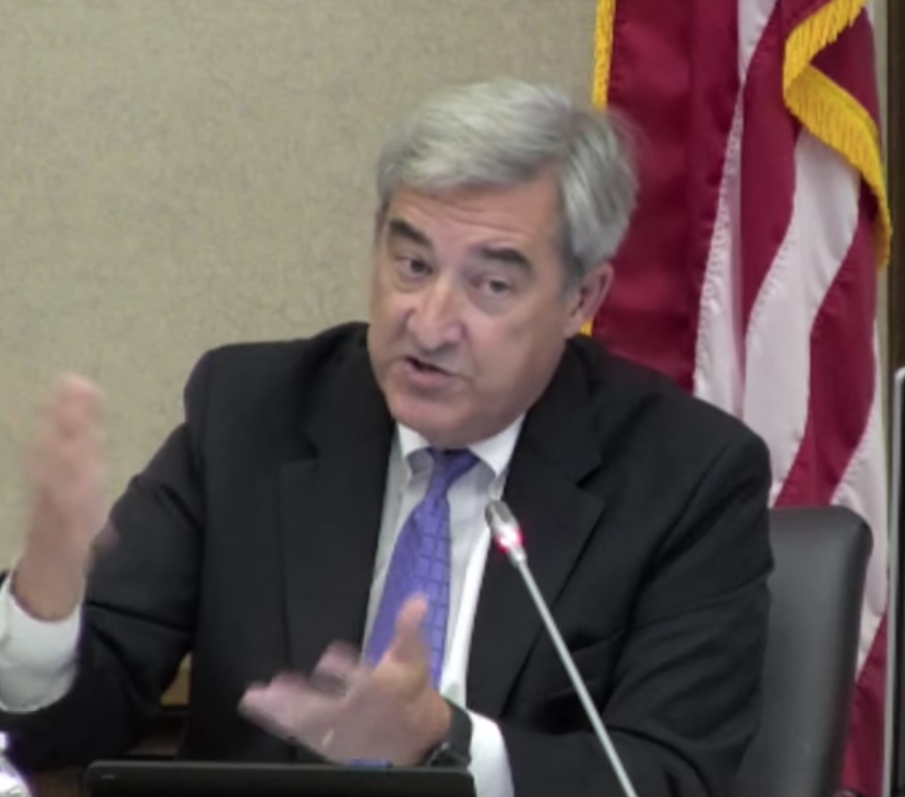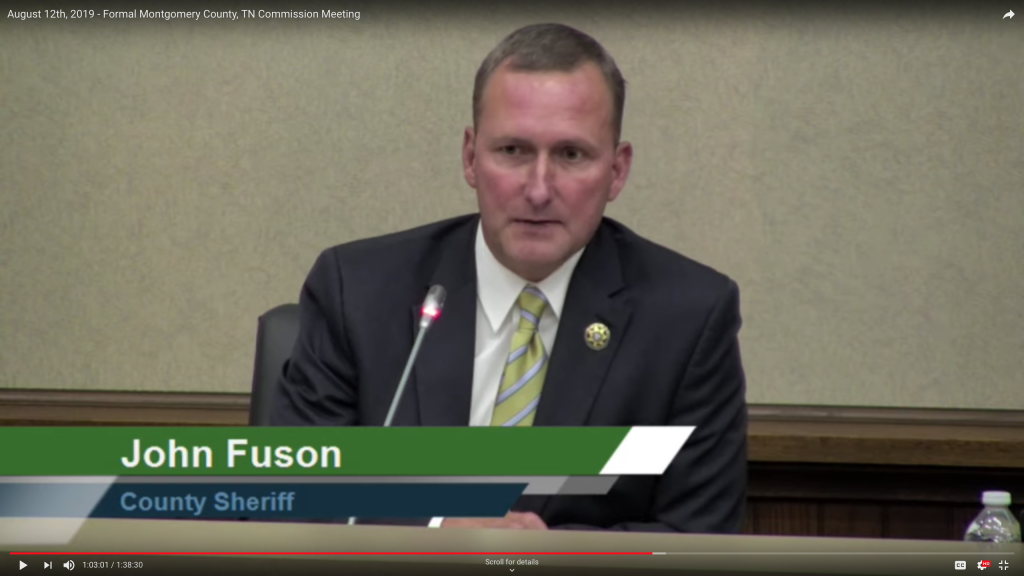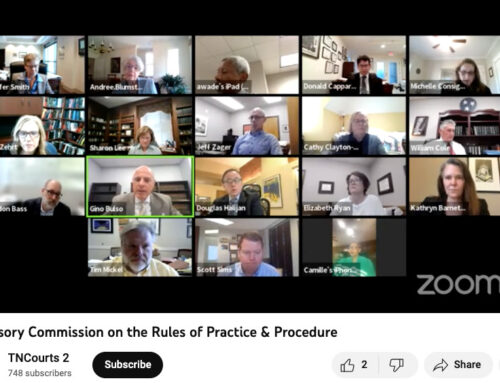Montgomery County Commission bans citizens from livestreaming meetings
The Montgomery County Commission voted this week to prohibit live broadcasts, or livestreaming, from within the commission chambers during meetings despite advice that such a prohibition could be unconstitutional.
The purpose of the amended rules, which also included other new restrictions, stated they were “to preserve the function, dignity and order of the proceedings.” But the county sheriff also told commissioners during the meeting that allowing live broadcasts created a security concern.
The sheriff said he could not discuss details about the security problem caused by live broadcasts because that in itself would cause a security issue.
County provides video on YouTube

The county already provides a professional live broadcast of its meetings on a YouTube channel, something few other Tennessee counties do, said commissioner Tangi Smith, who chairs the rules committee that proposed the change.
She and others argued that this service adequately gives citizens a chance to follow along the meeting and eliminates any need for a citizen to livestream to their Facebook page.
However, Commissioner Jason Knight said just because a live broadcast is provided by the county doesn’t give the county commission authority to restrict individuals who might want to livestream the meeting, or parts of a meeting, on their Facebook page.
AG says restrictions must be based on disruption, public safety
Knight provided a packet to all commissioners which contained an Attorney General’s opinion from 1995 that said a governing body could restrict the use of video cameras or other devices in a public meeting but only if it was a reasonable restriction based on the activity causing a disruption or public safety issue.
He also said he had gotten advice from the County Technical Advisory Service and the Tennessee County Commissioners Association that Montgomery County’s proposed ban would be in violation of the law.
Knight had suggested an amendment to the resolution that would have required those who wanted to livestream to notify the commission 48 hours in advance and be restricted to whatever parts of the room decided by the county mayor. But his amendment failed.

The county’s attorney, Tim Harvey, gave the commission an overview of the law that would govern any restriction placed on citizens who wanted to video the meeting.
He went through various points of the law and opinions, including details of the December 1995 Tennessee Attorney General’s opinion that concluded a ban on video or photography at the meeting, would not be justified under the Tennessee Constitution and Tennessee Open Meetings Act.
That opinion said:
Under Article I, Section 19 of the Tennessee Constitution, a city council
Tennessee Attorney General Opinion 95-126
may only regulate access to its public meetings in a manner that reasonably serves public safety and welfare, or its ability to conduct orderly and efficient proceedings. Based on the authorities discussed above, it is the opinion of this Office that these interests would not be deemed sufficient to justify a total ban on video and photographic equipment at city council meetings or on photographing those present at the meeting. The breadth of the proposed total ban goes well beyond that which is reasonably related to the city’s legitimate interests. This Office is further of the opinion that city governing bodies may regulate the use of such devices, but only in a manner reasonably calculated to serve the public safety and welfare or the interest in conducting efficient and orderly public meetings. For example, a city council may prevent cameras from being operated in a manner that actually disrupts a council’s proceedings, that presents a danger to the public safety, or that otherwise prevents the council from conducting an orderly and efficient meeting.
“What I do is try to advise you is what will be litigated. The question that will be litigated is the one I pointed out to you. Is it reasonable to restrict live-time broadcast because it’s disruptive to the meeting, because it’s a security concern, or that it … otherwise prevents the council, the commission, from conducting an orderly and efficient meeting,” Harvey said.
Harvey pointed out that during the committee meetings on the new rules, there was discussion about security concerns of live broadcasts.
One commissioner mentioned the recent mass shootings and reiterated that the sheriff, who was in charge of safety at the public meeting, thought livestreaming created a security issue.
Sheriff says livestreaming creates avenue for harm
No examples were given in which livestreaming or live broadcasts resulted in a security breach or public safety problem either in Montgomery County or elsewhere. But the sheriff said livestreaming created a potential for a “wrongdoer” to cause harm.

“I think anything that requires an individual to record certain aspects of a public meeting or a public place could create an avenue for a wrongdoer to do something against us,” Sheriff John Fuson said.
“Whenever it came up, the recording that goes on in the chambers is something we are very aware of. We’re watching people in this building constantly to make sure that you’re safe and that they’re safe. So when they carry on a recording that may not make us safe, then that’s a security concern that needs to be addressed. I think this rule is a reasonable rule to help prevent a potential bad security issue from happening in this building. The only thing that I can answer to you is yes it is a security concern from my end. As far as going into more detail about those security concerns, I think is a security concern in itself.
Most commissioners saw no need for someone to livestream a meeting in light of the meetings already being put on YouTube. However, Commissioner, Joshua Beal asked what would happen if the county commissioners decided to stop putting their videos on YouTube.
The county mayor, Jim Durrett, said he wasn’t proposing ending the county service of video of the meeting, but also said it was not required by law. He said the county had been doing it for about 3 1/2 years.
The provision regarding the live broadcasts reads: “No live broadcast from within the Commission Chambers of its proceedings in whole or in part is allowed. A simultaneous broadcast of the proceedings is available on the internet at “YouTube” and the same is preserved there for an extended period.”
The amended rules also now require that an area will be designated within the commission chambers for use of audio and video recording devices by the press and others that will provide “ample position and opportunity to record by audio and video means the official business of the Commission while in session.”




